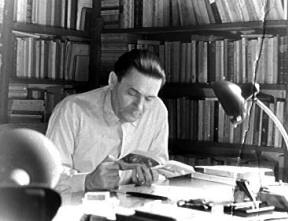.
Domenico Fusco
(edited by Peter John Mazzoglio)

.
Domenico Fusco was born in Bari (Puglia, southeast Italy) on 3rd September 1911 from Vincenzo and Pasqua Stasi. He graduated as master mariner in the Nautical Institute of his home-town, in 1930 he attended the school for cadet officers in Moncalieri (Turin, Piedmont, northwest Italy) and the course of horse artillery. With second lieutenant artilleryman degrees he ended the military service in Belluno and in other cities of Venetia. On his return home he matriculated at the Faculty of Economy and Commerce. He was a learned, witty, and expansive bibliophil, his ambition was to undertake the journalistic career and he had already entered into relations with antiquarian booksellers, journalists, and publishers.
The love for books was precocious in Domenico Fusco. He used to say that already in his mother’s womb he was in company of a book; therefore, little by little, besides devouring books by reading them, he began writing.
In the university years he wrote “The enigma of Somerset Street” and the essay “A satirical poem by Sordello”. But his studies were becoming an obstacle to a free and intense cultural evolution, therefore they were soon interrupted.
Domenico Fusco reached then his brother, an officer of the navy, in Civitavecchia and here he taught in the Nautical Institute; during this period he wrote the technical booklet “Mercantile and War Ships of all Centuries and Countries” and was correspondent of a Roman newspaper.
In 1939 he enrolled as a volunteer of the Italian army in the war of Spain; during the Second World War he was stationed in Puglia and Piedmont, then he was sent to Rhodes, where he remained until the armistice. Then, captured by the German troops he was destined to the imprisonment in Germany in several concentration camps.
On his return from the war, he was employed in the antiquarian section of the library of the newspaper company La Stampa, in Turin. It was thanks to this employment that in the years 1946 and 1947 he wrote the cards used for “Original Editions of Italian Writers (1900-1947)”.
When the library closed down in 1948, he began a librarian activity of his own: “Fusco’s Antiquarian Bookshop”. In the same year he sent to the press his “Eroticism and Pornography in the French Novel. A critical-bibliographical essay”. In 1949, with his friend and publisher Serafino Berruto, he edited a magazine “The Curious, a Bimonthly Magazine of Sexual Investigation”. But only four numbers were issued, followed by complaints and attachments; since then Domenico Fusco was persued by the authorities until a trial and a sentence of some months of confinement for the possession of obscene books.
In 1953 he published the essay “The Unknown and Apocryphal Aretino” and the “Reasoned Bibliography of ‘Gamiani’ by De Musset” and in 1962 the historical-bibliographical appendix to the “Ideology of Death” by Domenico Tarizzo on the extermination camps.
Domenico Fusco continued to give the best of himself in the articles that appeared in his antiquarian bookshop catalogues. They represented the channel through which he broadcast his pungent criticisms to the society of the age, reaching a circle of cultured readers scattered throughout Italy and also abroad. Customers and friends often tried to dissuade him from using the strong tones with which he led his cultural and moral battles. He made some enemies, but many men of culture, among which Giuseppe Prezzolini, appreciated his ideas and style.
The bookseller Domenico Fusco, a friendly, but polemical man, “who knows to hold the pen”, as he was defined, continued his activity in the bookshop until the end, with the help of his wife Rinalda. He was a heavy smoker and had to soccumb to the disease of the century in Turin on 31st January 1985.
Published works:
L'enigma di Somerset Street. Padua, 1933.
Una poesia satirica di Sordello. Bologna, 1934.
Navi mercantili e da guerra d'ogni secolo e d'ogni paese. Milan, Sonzogno, 1938.
Edizioni originali degli scrittori italiani (1900-1947). Turin, Berruto, 1948.
Erotismo e pornografia nel romanzo francese moderno. Saggio critico-bibliografico. Turin, Berruto, 1948.
L'aretino sconosciuto ed apocrifo. Turin, Berruto, 1953.
Bibliografia ragionata del "Gamiani" di De Musset. Turin, Berruto, 1953.
Appendix. In: Domenico Tarizzo "Ideologia della morte". Milan, Il Saggiatore, 1962.